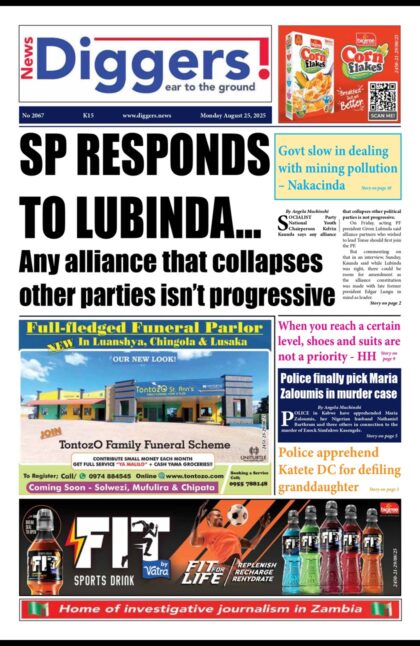The continuous low maize prices on the local market has demoralised farmers from cultivating the commodity because it costs more to produce, says Small-Scale Farmers Development Agency (SAFADA) executive director Boyd Moobwe.
And Moobwe says SAFADA will commence importing cheaper organic fertiliser in readiness to supply it to small-scale farmers in a bid to reduce the cost of production.
In an interview with News Diggers! in Lusaka, Moobwe said farmers had continued to plant maize with the hope that the market price would eventually be adjusted upwards, adding that they are disappointed and demoralised with the trend.
“In fact, I can confirm that farmers are now demoralised with the trend of putting more to produce the maize, but getting less in return. What the buyers have to know is that, the farmers have been planting the maize despite getting low returns, they have hope that in the long-run the prices would pick up. They had hope that in the long run prices would be adjusted upwards and they would benefit. That is the only reason why farmers have continued to cultivate maize. Otherwise, it is not giving them the profit, especially in Zambia. In the long-run, farmers have been disappointed with this marketing season in the country, especially where maize is concerned. I think when they are setting the market price for maize, they just look at the seed and fertiliser, but they forget that there is labour involved,” Moobwe said.
“It can’t [take] K65 to produce a bag of maize; it is going to cost you more. But they only consider the seed and fertiliser when coming up with a price. And they forget that if farmers stop cultivating maize, the entire nation can be affected because it is a staple food for this country. Most of the farmers are now contemplating on cultivating maize for their families only, and this could be a danger to the nation. So, to quickly respond, farmers are disappointed with the market system in Zambia. They do not plan on cultivating maize for sale anymore. Those who will cultivate next year will be the ones who still have hope that the prices might improve, or they will have hope that there will be few farmers cultivating and so the price might improve. But when they get disappointed, they will also stop producing for sale. Eventually, only a few farmers will be left to produce maize for sale, and like I said earlier, this could be the danger.”
And Moobwe added that his organisation would commence importing organic fertiliser, which he said is much cheaper and supply it to small-scale farmers in a bid to reduce the cost of production.
“I think the other problem is that farmers in the country have been conditioned to be mono; to plant only one main crop, which in most cases is maize. That is the problem. Now what happens is that when the prices are bad, it means that year is going to be bad for them. And it would take them years to recover from such loses and the buyers do not put all this into consideration. That is why as SAFADA, we have embarked on a sensitisation campaign to sensitise farmers about the dangers of planting one crop and the advantages of planting many. And it seems that a lot more of the small-scale farmers are complying with the messages that we have been putting across. We are urging them to diversify. Let them plant maize for their consumption, and then let them plant other crops, which they can sell. We are also sensitising them on the advantages of planting even just other crops as the main crops planted. For instance, they can plant sorghum and the main crop, while maize can be a minor,” said Moobwe.
“We are also going to import organic fertiliser for farmers to help them in reducing the cost of production. So, we will start this year to import organic fertiliser, which is much cheaper compared to the chemical ones. When we bring this type of fertiliser, we are hopeful that farmers can begin to realise profits from whatever they produce because the cost of production will reduce. Although the only difference is that the organic fertiliser does not have more potassium compared to the chemical one. But it is still very good, and it will benefit a lot of farmers countrywide.”
Last month, the Food Reserve Agency (FRA) revised upwards its maize purchase price of K65 per 50Kg bag for this year’s crop marketing season to K70, representing an increment of only K5, much to the dismay of farmers.
Farmers’ costs of maize production average around K129 per 50Kg bag of maize.























